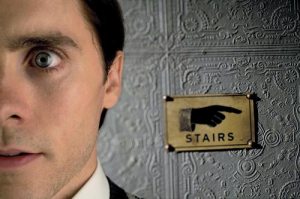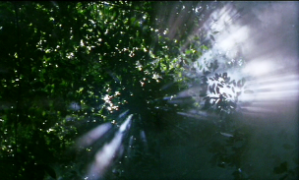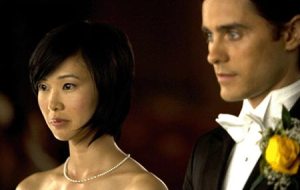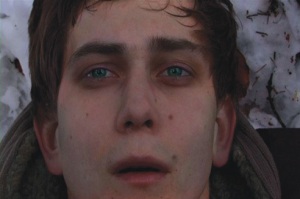Due to circumstances beyond my control (work), I didn’t get the chance to see that many films this day. I did, though, have an unpleasant encounter with a member of the film jury, which – if not anything else – convinced me that the winner of the festival’s jury prize will be left entirely to chance and incompetence. I wish the festival leaders had considered their jury choices a bit more carefully. More on this later.
 I first became aware of Belgian director Jaco van Dormael with his 1993-film Toto the Hero, which generally got rave reviews and which I liked. I seem to recall that I felt it put an unnecessary sentimentalism to the world of the child protagonist, but I think that was part of its theme. Not having seen the film since its cinema run 16 years ago, I don’t want to compare it with his latest work, which was my first film of the day.
I first became aware of Belgian director Jaco van Dormael with his 1993-film Toto the Hero, which generally got rave reviews and which I liked. I seem to recall that I felt it put an unnecessary sentimentalism to the world of the child protagonist, but I think that was part of its theme. Not having seen the film since its cinema run 16 years ago, I don’t want to compare it with his latest work, which was my first film of the day.
Mr. Nobody is by far his most ambitious project to date. It cost close to $50 million and features at least B-list Hollywood actors. It is filmed at several locations; Belgium, the famous Studio Babelsberg in Germany, in Canada and at several other places. Most of the money, though, must have gone to the impressive special effects which are very, very good. Very complicated fx shots integrate seamlessly with the “real” world and a number of editing tricks and film styles are on display.
The film is not only ambitious from a financial or technical perspective. The story seeks to sum up the entirety of the universe’s existence, and not only this universe. It is at times a period film, a science fiction story and a contemporary love story. It is about storytelling, parallel universes, time travel, religion, immortality and death. Most importantly it is about love.
 Jared Leto plays the grown up version of the protagonist Nemo Nobody and he does it well. I think this is his first leading role in a film of this magnitude. Then again, there are not that many films of this scope. In a way I felt the film was never quite only itself, but borrowed from a number of films and from the history of film. Perhaps it had to, but I felt at times that the director had seen the works of other directors he admired and tried to emulate them and, by combining their tropes, hoped to find something personal enough to call his own.
Jared Leto plays the grown up version of the protagonist Nemo Nobody and he does it well. I think this is his first leading role in a film of this magnitude. Then again, there are not that many films of this scope. In a way I felt the film was never quite only itself, but borrowed from a number of films and from the history of film. Perhaps it had to, but I felt at times that the director had seen the works of other directors he admired and tried to emulate them and, by combining their tropes, hoped to find something personal enough to call his own.
There is a bit of Darren Aronofsky’s the Fountain here, but on an even bigger thematic scale. Kubrick’s 2001 is quoted in some images. In a scene depicting humanity’s pre-existence, the moments before we are conceived, Van Dormael used the Melanesian music from Terrence Malick’s The Thin Red Line while at the same time putting this music to images of white and black children playing innocently together in a heavenly innocent state. So, in other words, welcome to the beginning of The Thin red Line! The basic concept of splitting destinies – of turning into several future versions of oneself – based on a choice made while standing by a train, is found in the less ambitious Gwyneth Paltrow vehicle Sliding Doors. The drowning in a car scene reminded me of Lars Von Trier’s Europa (By the count of ten you will be dead, as Max Von Sydow laconically narrates in that film). In a way Mr. Nobody is two and a half hours awaiting said count. I could go on, but you get the point.
 It is not easy to sum up what this film is about. When the protagonist is forced to make a faithful choice at the age of nine (I think), he is separated into two persons, depending on which choice he makes. Within these two possible characters comes a further three choices – which makes it six characters(?) – based on his choice of girlfriend as an adolescent. One version of himself turns out to be a lecturer in astrophysics, who sometimes enters the action to lecture the viewer about the history and philosophy of the universe. He says there are seven dimensions in the universe; six of these are spatial, while the seventh is temporal. He then poses the question of whether the temporal – time – inhabited more than one dimension. (I take this from memory, so forgive me for any inaccuracies!) To complicate matters further, another one of these personalities takes up writing, creating a fictional world that in the film is presented as just as real as the non-fiction worlds. This fiction takes the action to space (to Mars) and the future. However, another future is also depicted in the film, a future where the protagonist is the last mortal human alive (and thus, the last who remembers love and lust; you don‘t need children if you live forever…) There is a point to this, but I won’t discuss it here, so as not to spoil the film.
It is not easy to sum up what this film is about. When the protagonist is forced to make a faithful choice at the age of nine (I think), he is separated into two persons, depending on which choice he makes. Within these two possible characters comes a further three choices – which makes it six characters(?) – based on his choice of girlfriend as an adolescent. One version of himself turns out to be a lecturer in astrophysics, who sometimes enters the action to lecture the viewer about the history and philosophy of the universe. He says there are seven dimensions in the universe; six of these are spatial, while the seventh is temporal. He then poses the question of whether the temporal – time – inhabited more than one dimension. (I take this from memory, so forgive me for any inaccuracies!) To complicate matters further, another one of these personalities takes up writing, creating a fictional world that in the film is presented as just as real as the non-fiction worlds. This fiction takes the action to space (to Mars) and the future. However, another future is also depicted in the film, a future where the protagonist is the last mortal human alive (and thus, the last who remembers love and lust; you don‘t need children if you live forever…) There is a point to this, but I won’t discuss it here, so as not to spoil the film.
While the plot of the film seems incredibly advanced and ambitious, to its credit, we are never lost and most times understand perfectly where we are in the story and what is depicted. Actually, I had no problems with the science fiction elements of the tale. They are well thought and very well executioned. It is in the way the film revolves around the concept of love that I feel it loses itself a bit; it becomes a bit too much.
 One kind of love that is decisive for Mr. Nemo Nobody is the child’s love for his parents. Another kind of love is the puppy love between nine year olds, then the lustful love between adolescents and finally the emotional, during and at times hard and stressful love between spouses. Put together, this becomes a whole lotta love, as the song says. Now, if the love theme had been presented a bit more smartly, I wouldn’t have any problems with it. (While it is presented in a complicated tale, this doesn’t make the kind of love on display any more “intelligent” or new to the viewer). Especially irritating is the extremely cliché ridden music the director has chosen for the soundtrack. There are just so many times you can hear Mr. Sandman, bring me a dream… Almost every scene has music that has been used so often before in films that it brings you as a viewer out of the film’s universe and at least I began pondering boredom and references rather than the action taking place before me.
One kind of love that is decisive for Mr. Nemo Nobody is the child’s love for his parents. Another kind of love is the puppy love between nine year olds, then the lustful love between adolescents and finally the emotional, during and at times hard and stressful love between spouses. Put together, this becomes a whole lotta love, as the song says. Now, if the love theme had been presented a bit more smartly, I wouldn’t have any problems with it. (While it is presented in a complicated tale, this doesn’t make the kind of love on display any more “intelligent” or new to the viewer). Especially irritating is the extremely cliché ridden music the director has chosen for the soundtrack. There are just so many times you can hear Mr. Sandman, bring me a dream… Almost every scene has music that has been used so often before in films that it brings you as a viewer out of the film’s universe and at least I began pondering boredom and references rather than the action taking place before me.
Another unfortunate effect of the music has to do with its placement. When the protagonist as a young boy sees a girl his age, nine, swimming, a lusty soul-number is played, thus turning her into a kind of sex object. This is disturbing and can’t have been the director’s intention. While he wants to tell us that the protagonist falls in love at this moment, there must surely be better ways to sonically enhance this element!
Then there is the fact that all of Nemo’s love stories revolve around three girls that he meets as a young child. I find it a bit far fetched that these same girls shall also be his only interests in adolescence and in marriage. The film is, then, not only about premeditation, but about an emotional stiltedness, as if Nemo doesn’t really evolve during the film and this is the reason for his future being so clearly delineated into his separate possible selves. The name Nemo, by the way, does not refer to the captain of the Nautilus. You’re better served by reading it backwards.
 In closing, I’ll venture to say that the word ambitious will surely be used in pretty much every review of this film. (It wasn’t finished in time for Cannes, so it hasn’t been shown that many places yet). While it is certainly intricate, it ultimately doesn’t convince me. While I’m perfectly willing to take any leaps of logic that the film requires of me, I’m not sure that it ultimately adds up. I have a strong feeling that there are internal discrepancies within the fantastic logic. This should have been worked out a bit better, but I think I will need to see the film a second time to really pinpoint these errors. (And the ones I could point out would ruin the ending, so I’ll refrain).The problem is that, as much as I admired the film for what it’s trying to do, it was just a bit too long and ultimately not all that it could have been, so a second viewing will probably not take place in the immediate future. But if you are in the mood for a lengthy love story told in a brilliant technical style and with a basic sience fiction concept underlining it all, by all means take a chance on the film! I think it deserves an audience and it is without doubt a much better film than The Curious Case of Benjamin Button, which was half the rave at this year’s Oscars, and which it also shares some sensibility with. Being the better film of the two, I’m also sure that it won’t find half the audience of Fincher’s unfortunate detour into drivel and mediocrity.
In closing, I’ll venture to say that the word ambitious will surely be used in pretty much every review of this film. (It wasn’t finished in time for Cannes, so it hasn’t been shown that many places yet). While it is certainly intricate, it ultimately doesn’t convince me. While I’m perfectly willing to take any leaps of logic that the film requires of me, I’m not sure that it ultimately adds up. I have a strong feeling that there are internal discrepancies within the fantastic logic. This should have been worked out a bit better, but I think I will need to see the film a second time to really pinpoint these errors. (And the ones I could point out would ruin the ending, so I’ll refrain).The problem is that, as much as I admired the film for what it’s trying to do, it was just a bit too long and ultimately not all that it could have been, so a second viewing will probably not take place in the immediate future. But if you are in the mood for a lengthy love story told in a brilliant technical style and with a basic sience fiction concept underlining it all, by all means take a chance on the film! I think it deserves an audience and it is without doubt a much better film than The Curious Case of Benjamin Button, which was half the rave at this year’s Oscars, and which it also shares some sensibility with. Being the better film of the two, I’m also sure that it won’t find half the audience of Fincher’s unfortunate detour into drivel and mediocrity.
While Mr. Nobody may be flawed, it is at least interesting enough for me to have given it more attention and space than most films. This is more, much more than I can say for the next film I had the misfortune to attend this day. I guess I should have seen the warning signs; it being French the clearest.
 Un Lac – A Lake – is a minimalist work about an epileptic boy, his sister and family in an unknown wintry location. This is the second film as writer/director for Philippe Grandrieux, his fourth as director. On this film, he also serves as cinematographer, so he is an auteur in the real sense. The problem is that he is just not a very interesting one. Most of the actors are, for some reason Russian, and it is filmed in France and Switzerland. And the landscape does seem wonderfully oppressing and beautiful at the same time. That is, if any of the images had been in focus. (The images of the brother and sister found to the left are pretty much the only two clear images of the film)
Un Lac – A Lake – is a minimalist work about an epileptic boy, his sister and family in an unknown wintry location. This is the second film as writer/director for Philippe Grandrieux, his fourth as director. On this film, he also serves as cinematographer, so he is an auteur in the real sense. The problem is that he is just not a very interesting one. Most of the actors are, for some reason Russian, and it is filmed in France and Switzerland. And the landscape does seem wonderfully oppressing and beautiful at the same time. That is, if any of the images had been in focus. (The images of the brother and sister found to the left are pretty much the only two clear images of the film)
Grandrieux uses a handheld camera style that is extreme in its use of closeups and movements following the characters so closely that we are supposed to see the world as they themselves do. The mother of the family is blind, though it took me some time to decipher this. Many of the scenes are filmed in near darkness and the ones that are not are foggy and out of focus. The brother has a close relationship with his sister, possibly incestuous, but I was never able to tell for sure. His epileptic fits grows in frequency. He is at times very happy for no apparent reason, at times he is moody. One day he is by the cold lake that seems to be the only contact with a wider world. A young man arrives. He says his name is Jurgen. Soon this man starts a relationship with the sister and finally they sail off on the same lake. This is the film. Or what I managed to see of the film.
 Do not misunderstand me. I have no problems with challenging films, be it in narrative or in film style. This film, however, is ridiculous, very boring and unbearably pretentious. The dialogue is almost non-existent. Perhaps this is a good thing, for when they speak, they speak platitudes. “You are my sister”, the brother says. Then he adds: “I am your brother”. Yes, well, you had me at sister…
Do not misunderstand me. I have no problems with challenging films, be it in narrative or in film style. This film, however, is ridiculous, very boring and unbearably pretentious. The dialogue is almost non-existent. Perhaps this is a good thing, for when they speak, they speak platitudes. “You are my sister”, the brother says. Then he adds: “I am your brother”. Yes, well, you had me at sister…
Of course one can read something symbolic out of the minimalist setting and action. The more minimalist a work is, the easier to regard it as symbolical of something. But here even the symbolic meaning is trite and clichéd. Perhaps the director wants to deal with archetypes, with a biblical simplicity. If so, he fails miserably. Is he interested in hidden pockets of humanity, of humanity’s place in an unforgiving and uncaring nature? Well, he doesn’t come even close. Perhaps he wants to talk about female sexuality and awakening. If so, he says nothing new and certainly nothing of interest. – If you want an arty film about this, watch Picnic at Hanging Rock again! You will be grateful for it. Do not waste your time with Un Lac. With the basic setting of these characters in this kind of nature, you have to be pretty incompetent not to make it even slightly interesting or even beautiful even in a harrowing sense. Unfortunately, competence has no place here.
It strikes me that writing even disparagingly about the film, I make it sound better than it is. Give me a camera, this location and these characters and I would have made a better film. Look away, there is nothing to see here! By the way, this was a film I had high hopes for and that I really wanted to like. More the fool me.